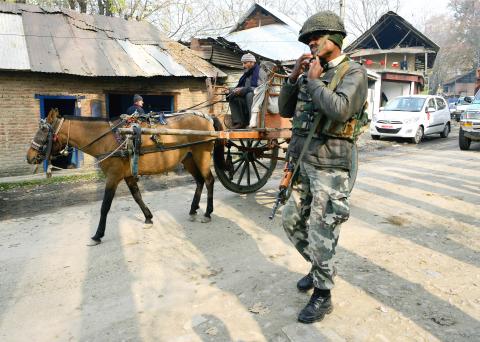India approved a 158 billion rupee (US$2.5 billion) purchase of artillery, the first acquisition of large-caliber guns since the 1980s, as Indian Prime Minister Narendra Modi seeks to modernize the armed forces.
The Indian Defence Acquisition Council authorized 229 billion rupees of procurements yesterday, including the artillery, a government official told reporters in New Delhi, asking not to be identified citing rules.
The meeting was the first since Indian Defence Minister Manohar Parrikar took up the role earlier this month.

Photo: AFP
India has authorized US$19 billion of weapons purchases since Modi swept to power in May and has taken a firmer line in border disputes with Pakistan and China. Parrikar has vowed quick and transparent decisionmaking to spur the military of the world’s largest importer of major conventional weapons.
PRAGMATIC
“The Modi government is more realistic and pragmatic when it comes to defense acquisitions,” said Amit Cowshish, a distinguished fellow at the Institute for Defence Studies and Analyses in New Delhi. “Earlier, defense procurements used to get stuck for years on flimsy grounds.”
The next step is to seek tenders for the manufacture of the artillery. If a foreign manufacturer wins the tender, the first 100 pieces are to be imported and the remaining 714 made in India through technology transfer.
Modi is trying to encourage domestic production, a policy discussed at the meeting, the official said.
A decision on a proposal from the defense units of India’s Tata Sons Ltd and Europe’s Airbus Group NV to supply transport aircraft was deferred, the official said.
MARITIME NETWORK
Parrikar also commissioned a maritime security intelligence sharing network yesterday.
Its objective is to monitor the Indian Ocean region for threats, such as the 2008 Mumbai terror attacks.
“In energy security and security, we can’t be dependent on others,” the defense minister said at the event, in response to a question about the goals Modi had set for him.
Sanctions or blockades can cut off key suppliers, indicating India must work toward self-reliance for energy and military needs, Parrikar said.
Last year, India’s biggest state-run weapons maker tested a locally made piece of artillery produced off 1980s blueprints in the deserts of Rajasthan — when it fired, the barrel cracked. That is just one example of the nuclear-armed nation’s struggle to introduce its first new artillery since 1986.
Modi faced defense spending near a 50-year low as a percentage of the economy when he took power six months ago.
A history of corruption scandals slowed military purchases.
Aside from authorizing weapons purchases, the government has loosened restrictions on procurement from defense manufacturers affected by graft allegations and made it easier for private companies to maintain military equipment.
Modi has also allowed higher foreign investment in the defense industry and his administration is said to target the signing of a contract for 126 Dassault twin-engine Rafale fighter jets by the end of the year.

With much pomp and circumstance, Cairo is today to inaugurate the long-awaited Grand Egyptian Museum (GEM), widely presented as the crowning jewel on authorities’ efforts to overhaul the country’s vital tourism industry. With a panoramic view of the Giza pyramids plateau, the museum houses thousands of artifacts spanning more than 5,000 years of Egyptian antiquity at a whopping cost of more than US$1 billion. More than two decades in the making, the ultra-modern museum anticipates 5 million visitors annually, with never-before-seen relics on display. In the run-up to the grand opening, Egyptian media and official statements have hailed the “historic moment,” describing the

‘CHILD PORNOGRAPHY’: The doll on Shein’s Web site measure about 80cm in height, and it was holding a teddy bear in a photo published by a daily newspaper France’s anti-fraud unit on Saturday said it had reported Asian e-commerce giant Shein (希音) for selling what it described as “sex dolls with a childlike appearance.” The French Directorate General for Competition, Consumer Affairs and Fraud Control (DGCCRF) said in a statement that the “description and categorization” of the items on Shein’s Web site “make it difficult to doubt the child pornography nature of the content.” Shortly after the statement, Shein announced that the dolls in question had been withdrawn from its platform and that it had launched an internal inquiry. On its Web site, Le Parisien daily published a

China’s Shenzhou-20 crewed spacecraft has delayed its return mission to Earth after the vessel was possibly hit by tiny bits of space debris, the country’s human spaceflight agency said yesterday, an unusual situation that could disrupt the operation of the country’s space station Tiangong. An impact analysis and risk assessment are underway, the China Manned Space Agency (CMSA) said in a statement, without providing a new schedule for the return mission, which was originally set to land in northern China yesterday. The delay highlights the danger to space travel posed by increasing amounts of debris, such as discarded launch vehicles or vessel

RUBBER STAMP? The latest legislative session was the most productive in the number of bills passed, but critics attributed it to a lack of dissenting voices On their last day at work, Hong Kong’s lawmakers — the first batch chosen under Beijing’s mantra of “patriots administering Hong Kong” — posed for group pictures, celebrating a job well done after four years of opposition-free politics. However, despite their smiles, about one-third of the Legislative Council will not seek another term in next month’s election, with the self-described non-establishment figure Tik Chi-yuen (狄志遠) being among those bowing out. “It used to be that [the legislature] had the benefit of free expression... Now it is more uniform. There are multiple voices, but they are not diverse enough,” Tik said, comparing it